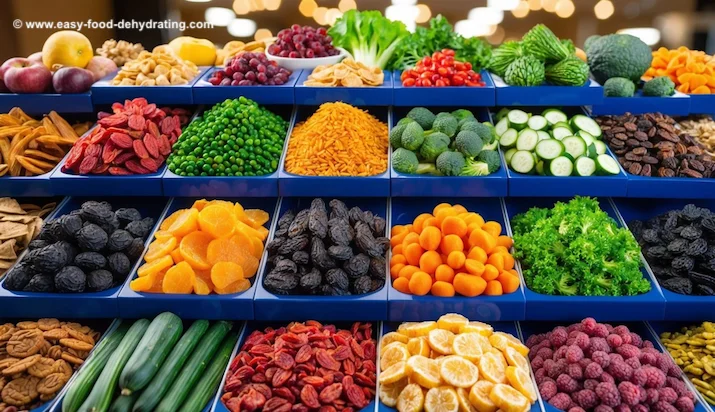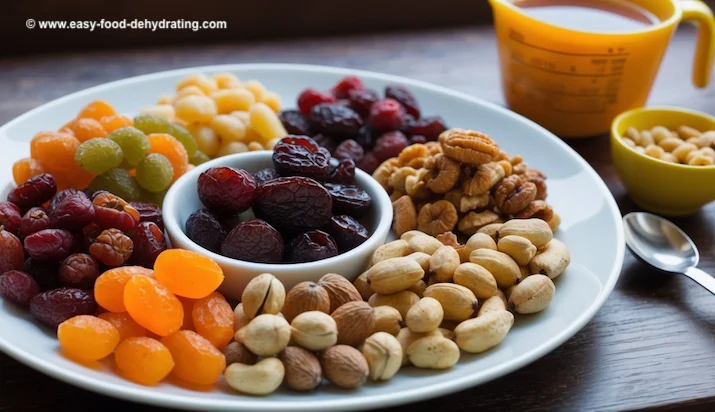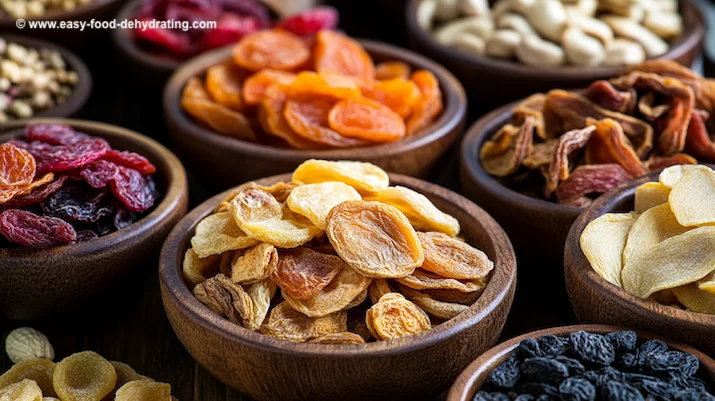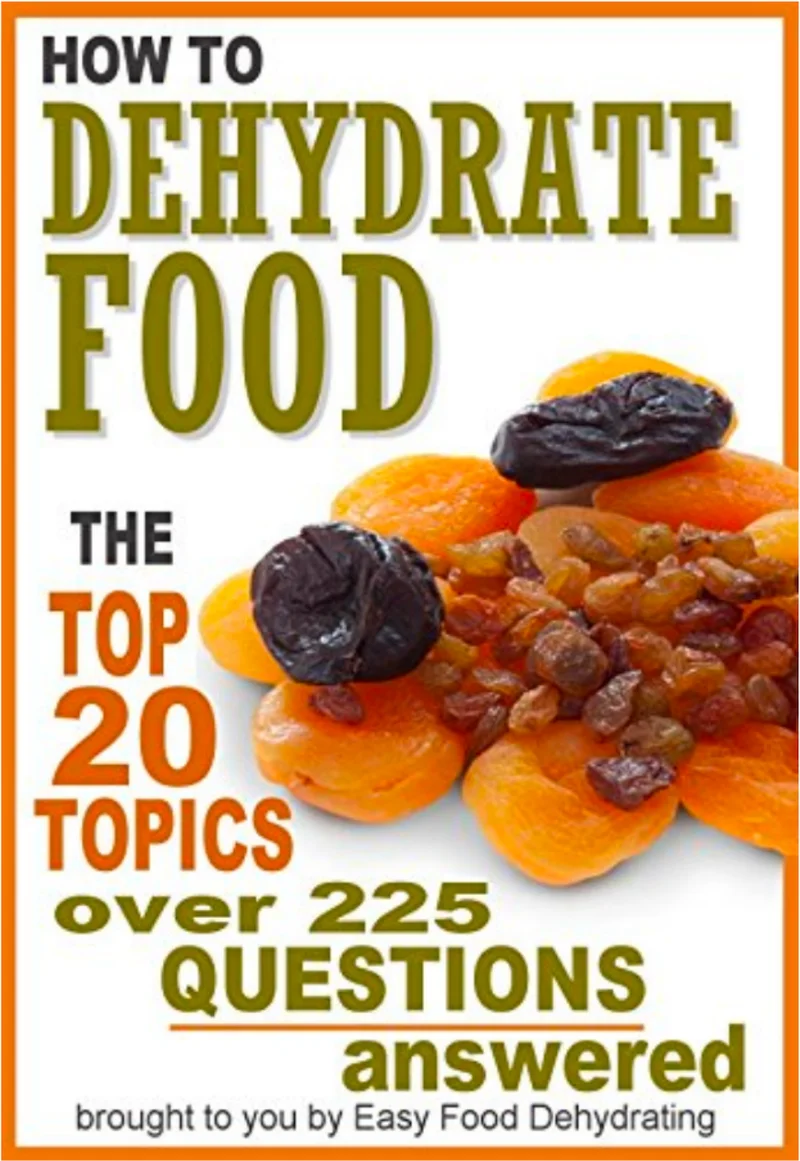What We Mean by “Dehydrate”
Here at Easy Food Dehydrating, “dehydrate” always means using an electric food dehydrator — the easy, reliable way to dry food at home.
- Home
- Articles On How To Dehydrate Food Safely
- Benefits of Dried Food: Healthy, Convenient, and Tasty
Benefits of Dried Food:
Tasty, Nutritious, Convenient

Dried foods are more than just pantry fillers—they’re nutrition powerhouses that save money, reduce waste, and add convenience to everyday meals. From crunchy apple slices to protein-packed beef jerky, dried foods deliver flavor and nutrients in a shelf-stable form that lasts for months.
✅ Quick Answer: What are the benefits of dried food?
Dried foods are lightweight, shelf-stable, and nutrient-dense. They save money, reduce food waste, and provide fiber, protein, and antioxidants in a convenient form—making them ideal for healthy snacking, emergency storage, and everyday cooking.
Whether you’re hiking, meal-prepping, or building a reliable emergency pantry, the benefits of dried food make it a smart choice for health, budget, and lifestyle.

From dried fruits to jerky, these foods pack a nutritional punch in a small package. Did you know, dried bananas are a good source of fiber and potassium, supporting gut and heart health? Beef jerky provides high protein content and essential nutrients like zinc, B12, and iron.
While dried foods offer numerous benefits, it's important to be mindful of portion sizes and added sugars. We'll explore how to incorporate these nutritious options into your diet and make the most of their health-boosting properties.
- Dried foods offer concentrated nutrients and convenience for a healthy lifestyle.
- Portion control is crucial when consuming dried fruits and meats.
- Incorporating a variety of dried foods can enhance your diet's nutritional value.
What Exactly Is Dried Food—and Why Should You Eat It?

Dried food is a preservation method that removes moisture from fruits, vegetables, meats, and other foods. This process concentrates flavors and nutrients while extending shelf life. Let's explore how drying works and why it's beneficial.
How Drying Works: The Science Behind Nutrition Retention
We use various methods to dry food. The most common is air drying, where we expose food to warm, dry air. This can be done naturally in the sun or with Nesco or Excalibur dehydrators and regular ovens. As moisture evaporates, it leaves behind concentrated nutrients and flavors.
For fruits and vegetables, we often slice them thinly to speed up drying. Meats are typically pre-treated with salt or marinades. The drying time can range from a few hours to several days, depending on the food and method used.
Heat obviously plays a crucial role in the drying process and for that reason we carefully control the temperature to remove moisture without cooking the food. This preserves nutrients and prevents the growth of harmful bacteria.
Why Dried Foods Last Longer Than Fresh—The Shelf Life Secret
Removing water from food offers several advantages. First, it dramatically extends shelf life. Dried foods can last months or even years when stored properly. This reduces waste and allows us to enjoy seasonal produce year-round.
The concentrated nature of dried foods makes them nutrient-dense. For example, dried apricots contain more fiber and nutrients per serving than fresh ones. This makes dried foods an excellent option for hikers, travelers, and anyone seeking portable nutrition.
We also benefit from the intensified flavors in dried foods. They can add a punch of taste to various dishes, from trail mixes to gourmet recipes. Plus, the reduced weight and volume make dried foods easy to store and transport.
The Nutritional Edge: What Dried Foods Add to Your Diet

Dried foods offer a concentrated source of essential nutrients. They provide a convenient way to boost our intake of vitamins, minerals, fiber, and antioxidants in a shelf-stable form.
Vitamins & Minerals You Get More Of in Dried Fruits
Dried fruits are packed with essential vitamins and minerals. While some vitamin content may decrease during drying, many nutrients become more concentrated. For example, dried apricots contain higher levels of iron and potassium compared to fresh ones.
We can get a significant boost of vitamin A from dried mangoes and peaches. Dried figs and raisins are excellent sources of calcium. Many dried fruits retain their vitamin C content, though it may be reduced during processing.
It's important to note that some store-bought dried fruits have added sugars, so we should check nutrition labels. Unsweetened varieties offer the most nutritional benefits without extra calories.
Fiber & Protein: Why Dried Foods Keep You Full Longer
Dried foods are fiber powerhouses. A small serving of dried fruits or vegetables can provide a substantial portion of our daily fiber needs. This helps support digestive health and keeps us feeling full longer.
Dehydrated bananas are a good source of fiber, supporting gut and heart health. Dried beans and lentils offer both fiber and protein, making them excellent choices for plant-based diets.
Beef jerky and other dried meats are protein-rich snacks that can help us meet our daily protein requirements. These options are particularly beneficial for athletes or those looking to increase their protein intake.
Antioxidant Boost: How Dried Foods Protect Your Cells
The drying process concentrates antioxidants in many foods. These compounds help protect our cells from damage and may reduce the risk of certain diseases.
Dried fruits could play a role in reducing the risk of some cancers, thanks to their high antioxidant content. Dried goji berries, blueberries, and cranberries are particularly rich in these beneficial compounds.
Consider the benefits of dried herbs and spices as they also pack a powerful antioxidant punch. Adding these to our meals not only enhances flavor but also boosts our antioxidant intake. For example, dried oregano and thyme have high levels of antioxidants.
How to Enjoy Dried Foods Without Overdoing It

When it comes to dried fruits, we need to be mindful of our intake. While they offer many health benefits, it's crucial to pay attention to calories, sugar content, and portion sizes.
The Calorie & Sugar Truth About Dried Fruits
Dried fruits are nutrient-dense but can be high in calories and sugar. A small handful of raisins contains about 120 calories and 25 grams of sugar. We should be aware that the drying process concentrates sugars, making dried fruits sweeter than their fresh counterparts.
For those managing diabetes or watching their weight, it's important to monitor your sugar intake. Some dried fruits have added sugars, so we recommend choosing unsweetened varieties when possible.
Portion Size Secrets: How Much Dried Fruit Is Just Right?
Controlling portion sizes is key to enjoying dried fruits as part of a balanced diet. We suggest limiting dried fruit servings to about 1/4 cup, which is roughly equivalent to 1/2 cup of fresh fruit.
Eating in moderation helps us maintain a healthy weight and reduce the risk of obesity and type 2 diabetes. Here's a simple guide for dried fruit portions:
- 1/4 cup raisins
- 2 dried figs
- 3-4 dried apricots
By being mindful of our portions, we can still enjoy the nutritious benefits of dried fruits without over-consuming calories or sugar.
Health Benefits of Dried Foods You Might Not Expect

Dried foods offer numerous health advantages when incorporated into our diets. They provide essential nutrients, support various bodily functions, and can contribute to overall wellness in several key areas.
Can Dried Foods Really Improve Digestion?
Dried fruits are excellent sources of dietary fiber, which plays a crucial role in our digestive health. We can enjoy better digestion and prevent constipation by including foods like these dried banana cinnamon rolls in our diet. Enjoying dried fruits can help promote regular bowel movements and helps maintain a healthy gut.
Fiber also acts as a prebiotic, feeding the beneficial bacteria in our intestines. This supports a balanced gut microbiome, which is essential for optimal digestion and nutrient absorption.
For those of us watching our weight, the fiber in dried fruits can help us feel fuller for longer. This may aid in weight management by reducing overall calorie intake.
Potassium Power: How Dried Fruits Help Lower Blood Pressure
Many dried fruits are rich in potassium, an essential mineral for regulating blood pressure. For example, dried bananas provide 16% of our daily potassium needs in just a half-cup serving.
Potassium helps counteract the
effects of sodium in our bodies, which can lead to high blood pressure when
consumed in excess. By including potassium-rich dried fruits in our diet, we
can help maintain healthy blood pressure levels. Also, adequate potassium intake helps keep leg and foot cramps at bay (ask me how I know).
It's important to note that while
dried fruits are nutritious, they're also calorie-dense. We should enjoy them
in moderation as part of a balanced diet to reap their blood
pressure-regulating benefits without overdoing it in the calorie department.
Heart Health Benefits of Eating Dried Foods
Dried fruits can be valuable allies in promoting cardiovascular health. Many varieties are rich in antioxidants, which help protect our hearts by reducing oxidative stress and inflammation.
Some dried fruits, like raisins, are good sources of iron. This mineral is crucial for producing healthy red blood cells, which carry oxygen throughout our bodies, including to our hearts.
The fiber content in dried fruits also contributes to heart health by helping lower cholesterol levels. By reducing LDL (bad) cholesterol, we can decrease our risk of heart disease and stroke.
Strong Bones from Dried Fruits? Here’s the Science
Dried fruits can play a role in maintaining strong, healthy bones. Many varieties contain essential minerals like calcium, magnesium, and vitamin K, which are crucial for bone health.
Dried coconut, for example, provides 18% of our daily fiber needs in just one ounce. While not directly related to bone health, this fiber can aid in the absorption of bone-strengthening minerals.
Some dried fruits also contain boron, a trace mineral that helps our bodies metabolize calcium, magnesium, and phosphorus. This process is essential for building and maintaining strong bones throughout our lives.
Easy & Delicious Ways to Use Dried Foods Daily
Dried foods offer convenient and nutritious options to enhance our meals and snacks. We can easily add them to many dishes for extra flavor, texture, and health benefits.
Simple, Tasty Ideas to Add Dried Fruits & Veggies
Let's explore some tasty ways to enjoy dried fruits and vegetables:
- Trail Mix: Create a custom mix with dried fruits, nuts, and seeds for a portable snack.
- Salad Toppings: Sprinkle dried cranberries or raisins on salads for a sweet contrast.
- Oatmeal Boost: Add dried bananas to your morning oatmeal for extra fiber and potassium.
- Baked Goods: Mix chopped dried apricots into muffin or cookie batter for a fruity twist.
- Smoothie Enhancer: Blend dried goji berries or dates into smoothies for natural sweetness.
- Soup Garnish: Top soups with dried herbs or vegetable flakes for added flavor.
Smart Portion Tips for Getting the Most from Dried Foods
We can enjoy dried foods while maintaining a balanced diet:
- Use small containers to pre-portion dried fruits for snacks.
- Mix different types of dried fruits for variety in nutrients and flavors.
- Pair dried fruits with protein sources like nuts or yogurt to feel fuller longer.
- Rotate between fresh and dried options to maintain dietary diversity.
- Read labels to choose options without added sugars or preservatives.
Remember, a little goes a long way with dried foods due to their concentrated nature. Aim for a handful (about 1/4 cup) as a serving size for most dried fruits.
Your Top Questions About the Benefits of Dried Food, Answered
Are dried foods as healthy as fresh foods?
Are dried foods as healthy as fresh foods?
Yes—dried foods often contain the same nutrients as fresh, just in concentrated form. Fiber, minerals, and antioxidants become more dense, though some vitamin C may decrease.
Which dried foods are best for energy?
Which dried foods are best for energy?
Dates, raisins, figs, and bananas provide quick energy thanks to natural sugars and potassium. Jerky and lentils give longer-lasting energy from protein.
Can dried foods help with weight loss?
Can dried foods help with weight loss?
In moderation, yes. High fiber keeps you full longer, reducing snacking urges. Stick to ¼-cup portions of fruit and avoid added sugar varieties.
How should dried foods be stored for maximum freshness?
How should dried foods be stored for maximum freshness?
Store in airtight containers or vacuum-sealed bags in a cool, dark place. For long-term storage, use oxygen absorbers, desiccant packets, food vacuum-sealer bags, and Mylar bags.
What are the downsides of dried foods?
What are the downsides of dried foods?
They’re calorie-dense, so portion control matters. Some store-bought varieties contain added sugar or preservatives, so check labels for the cleanest option.
Dried foods really are the perfect blend of taste, nutrition, and convenience—whether you’re fueling a busy day, prepping for emergencies, or just craving a healthy snack.
To help you get started, grab the free 5 Dried Food Recipes You’ll Actually Love PDF (below). Inside, you’ll find my favorites: carrot soup, minestrone, split pea soup, spicy beef jerky, and banana cinnamon rolls. They’re simple, tasty, and ready to bring the benefits of dried food straight to your table.
Get 5 Dried Food Recipes You'll Actually Love
Here's where you can get your copy of our all new
5 Dried Food Recipes (That Actually Taste Great)
They're my all-time favorite easy dried food meals!
Get it here right now.
For Free!
Sources
https://www.health.com/dried-fruits-8416856
https://nutritionwell.ca/blog/herbs-and-spices-antioxidant-powerhouses/
https://smokedmeats.com/blogs/news/what-is-beef-jerky
https://loovfood.com/blogs/the-loov-blog/freeze-dried-fruit-explained-what-is-the-secret-to-convenient-and-nutritious-snacking
https://www.clinikally.com/blogs/news/benefits-of-different-dry-fruits
Before You Go...
If you enjoyed this page, tap the ❤️ in the lower right-hand corner.
It saves this page to your Grow bookmarks so you can find it again later.
You’ll also see quick share buttons to copy the link, post to Facebook,
or save it straight to Pinterest.
















